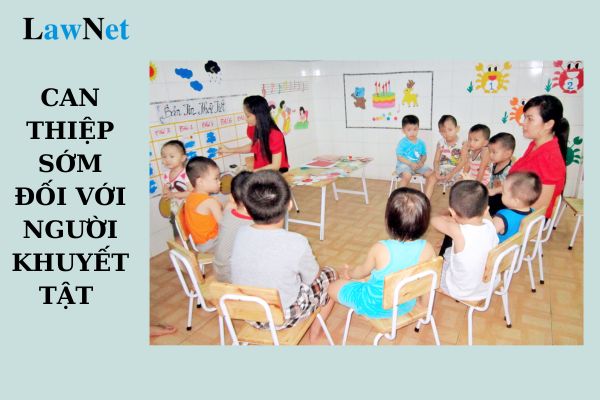What are regulations on early educational intervention for persons with disabilities in Vietnam? Who has authority for developing intervention plans for persons with disabilities in Vietnam?
What are regulations on early educational intervention for persons with disabilities in Vietnam?
Pursuant to clause 6, Article 2 of Circular 03/2018/TT-BGDDT, early intervention for persons with disabilities is understood as follows:
Explanation of Terms
In this document, the following terms are understood as follows:
...
- Early intervention is the activity of detection, prevention, and avoidance of risks leading to disabilities; minimizing the limitations caused by disabilities; enhancing the developmental capacity and increasing the ability of persons with disabilities to live independently in society.
Thus, from the above regulation, early intervention for children with disabilities can be understood as the activity of detection, prevention, and avoidance of risks leading to disabilities.
Early educational intervention helps to minimize the limitations caused by disabilities; enhance the developmental capacity and increase the ability of persons with disabilities to live independently in society.

What are regulations on early educational intervention for persons with disabilities in Vietnam? Who has authority for developing intervention plans for persons with disabilities in Vietnam? (Image from Internet)
Who has authority for developing intervention plans for persons with disabilities in Vietnam?
According to Article 5 of Circular 03/2018/TT-BGDDT, the authority responsible for developing and implementing early intervention activity plans for persons with disabilities is as follows:
Duties and powers of educational institutions implementing inclusive education
- Detect, mobilize, and admit persons with disabilities to study at the educational institution.
- Arrange and organize appropriate classes for persons with disabilities; ensure that each inclusive class has no more than 02 (two) persons with disabilities. In special cases, the head of the educational institution can arrange additional persons with disabilities in a class based on the actual conditions to ensure that all persons with disabilities wishing to study inclusively can attend school.
- Develop and implement early intervention activity plans, inclusive education; provide advice and vocational orientation suitable to the needs and capabilities of persons with disabilities.
- Develop an inclusive and friendly educational environment, ensuring that persons with disabilities are respected, supported, collaborated with, and can equally participate in all educational activities.
- Collaborate with families, the community, inclusive education development support centers, and specialized educational institutions to implement inclusive education.
- Support early intervention activities and the development of basic skills for persons with disabilities to integrate into the community.
- Provide information about the education of persons with disabilities studying inclusively at the educational institution to the council for determining the disability level of the commune, ward, commune-level town (hereinafter collectively referred to as commune level).
- Develop professional capacity for management staff, teachers, lecturers, and staff to meet the tasks of inclusive education.
- Mobilize human resources supporting inclusive education and utilize the state budget allocated for performing inclusive education tasks in accordance with legal regulations.
Thus, educational institutions have the right to develop and implement early intervention activity plans, inclusive education; provide advice and vocational orientation suitable to the needs and capabilities of persons with disabilities.
What are the rights and duties of persons with disabilities in inclusive education in Vietnam?
Rights of Persons with Disabilities
Persons with disabilities participating in inclusive education enjoy the rights specified in Article 15 of Circular 03/2018/TT-BGDDT:
Rights of Persons with Disabilities
In addition to the rights of students as specified, persons with disabilities in inclusive education enjoy the following rights:
- Persons with disabilities are allowed to enroll at an older age than the prescribed enrollment age.
- They are entitled to study at educational institutions suitable to their level and capacity; to be cared for, respected, and protected, treated equally in learning and educational activities to develop personal capabilities; to be provided with information, textbooks, learning supplies, and scholarships as prescribed.
- Persons with disabilities are allowed to study, practice, and receive support in individual learning sessions on specific knowledge and skills to effectively participate in inclusive education.
- They receive advice on support services, early intervention, inclusive education, and vocational orientation appropriate to their abilities and needs.
- They have the right to confidentiality of information about their disability status.
- They are commended and rewarded for achievements in learning and training.
- They enjoy educational policies regarding persons with disabilities as specified in Circular No. 42 and other current regulations.
Duties of Persons with Disabilities
The duties of persons with disabilities are specified in Article 14 of Circular 03/2018/TT-BGDDT:
Duties of Persons with Disabilities
In addition to fulfilling the duties of students as specified, persons with disabilities participating in inclusive education carry out the following duties:
- Study and practice according to the personal education plan of the person with disabilities.
- Provide information about health status, learning capability, and support needs to families, educational institutions when necessary.
- Respect management staff, teachers, and employees in the educational institution; foster unity, assistance, and support among peers in learning and practice; comply with school regulations; maintain and protect common property.
From the aforementioned regulations, apart from the prescribed rights and duties of students, persons with disabilities enjoy additional rights such as enrolling at an older age than the required, being advised on support services, early intervention, inclusive education, enjoying educational policies for persons with disabilities, etc., and must fulfill specific duties such as studying and practicing according to the personal education plan for persons with disabilities.

